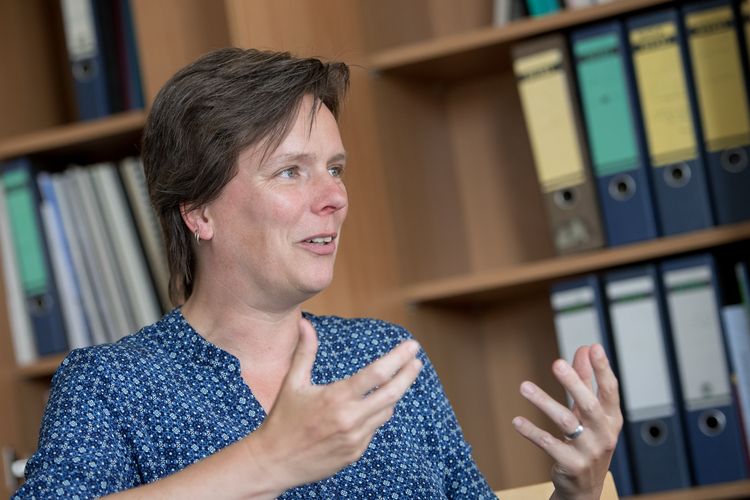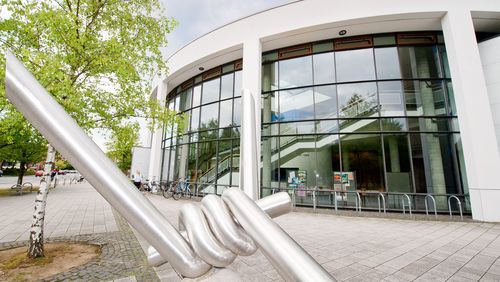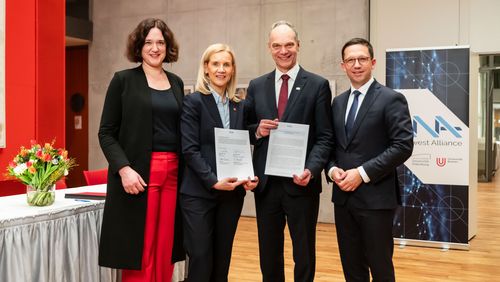"Internationalisation" is more than just a catchword for Oldenburg University. In addition to boosting its foreign student numbers it also aims to attract international researchers. Esther Ruigendijk, Vice President for Early Career Researchers and International Affairs, talks about creating a welcoming culture and recruiting the best brains.
QUESTION: According to the politicians, giving German universities an international profile is more important than ever. What are your views on this?
RUIGENDIJK: Basically, this is nothing new. Globalisation is advancing and this automatically has implications for universities, and has done for decades. But the current hype is also a good thing: it draws attention to the topic, and along with that the financial means to create new structures.
QUESTION: The competition is already fierce at the national level. How can a medium-sized university like ours prove its worth internationally?
RUIGENDIJK: In my opinion, as an educational institution we are automatically international. And it's crucial that we make the most of our strengths. We asked our foreign students about this and it emerged that living in Oldenburg is very cheap when compared internationally. But even more important for most students was the content. In other words, we need to advertise those degree courses in which we know we are among the best and excel.
"Science is inherently transnational"
QUESTION: You just talked about being "automatically international". What do you mean exactly?
RUIGENDIJK: Two things: a large number of immigrants and refugees live in Germany. Families of third and fourth-generation immigrants. This means that the student group has become much more diverse, comprising many different ethnic identities. So we have long since become international – in our own country, our own city, and in our own university. Secondly, science is inherently transnational. Only in the context of open, free and international discourse can new insights be gained.
QUESTION: If we're already international, what aspects does the university still need to work on?
RUIGENDIJK: On all those things that don't come automatically – the welcoming culture, for example. Students, researchers and staff from abroad should all be made to feel welcome here. For that to happen we must ensure that they have the information they need, and we have made gradual improvements in this area: from expanding our English-language Internet presence to adapting application forms and the translation of our Stud IP learning management system, which is currently underway. All complemented by adequate counselling and services. I'm also very enthusiastic about an initiative by our Staff and Organisation Development department: members of the University's administrative and academic staff can now attend redesigned English language courses that cater more to their individual needs.
QUESTION: Is there anything you feel is still lacking in this context?
RUIGENDIJK: Yes, multilingual signs on campus! But for me internationalisation doesn't just mean: "Let's have that in English too, now." Why not have signs in Russian or Dutch, where appropriate?
QUESTION: Are there plans to offer more degree courses in English?
RUIGENDIJK: We're looking at each faculty individually. In areas where we are already highly internationally oriented and have made a name for ourselves, like the Master's degree programme "Sustainable Economics and Management", it makes sense to do that. Another example is the new IT programme "Engineering of Socio-Technical Systems" at Faculty II. Here too, the subject has a strong research profile. Another area I think is important is cross-faculty programmes like EuGI…
QUESTION: You mean European Studies in Global Perspectives?
RUIGENDIJK: Precisely. With this course we're specifically targeting exchange students. The programme allows them to study Europe from different perspectives: from the perspective of social policy, language and culture, history or the economy.
QUESTION: But the focus is not just on "incoming students" but also on getting our students fit for studying abroad.
RUIGENDIJK:That's right. The idea of "internationalisation at home" is something I find exciting here. The question is: Why should students have to get on an airplane when they can gather intercultural experiences right here in their own city? The conditions in Oldenburg are very good for this: we have a degree course that deals with intercultural education, and scientists studying migration. There are concrete projects with refugees in which we as a university can participate. We could take better advantage of these factors for our "internationalisation at home".
QUESTION: So far we've spoken only about the students. What about the researchers?
RUIGENDIJK: They're just as important to us. Especially as we've been considerably more successful in recruiting among this group. Unfortunately, the proportion of foreign students in Oldenburg is still below average. We need to improve here. As regards doctoral candidates, however, the situation is very different: one in five comes from abroad – for a medium-sized university that's an excellent ratio.
QUESTION: Why are the researchers so important to you?
RUIGENDIJK:The focus of my work is not so much to keep student numbers up despite the demographic trend. I consider it far more important and future-oriented to attract the best brains to Oldenburg – whether they come from China, Italy or Germany. And the more broad-based our recruitment strategy is, the better this works. Our students also benefit as a result.
"Fewer pre-defined structures, more flexibility"
QUESTION: So how do you go about attracting potential international scientists to Oldenburg University?
RUIGENDIJK:Our university doesn't have that many pre-defined structures, which means that researchers have a lot of leeway here. Moreover, successful work quickly gains recognition – unlike at large universities where newcomers remain "invisible" for longer. Another major advantage is that because the research groups tend to be smaller, our young researchers get very good supervision.
QUESTION: And what would you say to foreign students?
RUIGENDIJK: Here in Oldenburg the distances are very short – on campus as well as between people. But the topics we stand for are also a key factor. In some areas of research, we are global leaders. We have some fantastic scientists who also excel in teaching and are looking for good coworkers. This, in combination with the flair of a small city close to the sea, makes our university pretty attractive.




